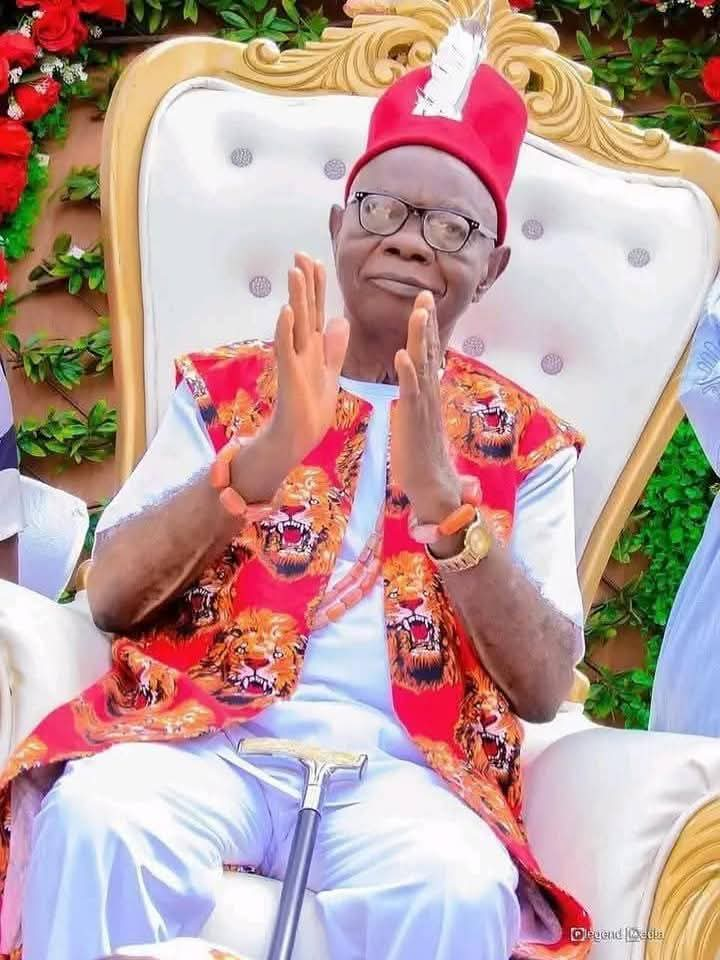NEWS
Tribute to Gentleman Mike Ejeagha by Emmanuel Nwazue

A fortnight ago, I stumbled upon a post—a video of some young men visiting Pa Mike Ejeagha, the revered master of Igbo folklore and music. As I watched, I commented, perhaps instinctively, “He is tired.” I did not mean fatigue of the body alone, but the quiet readiness of one who had lived long, spoken deeply, and given richly to a people. From every gesture, from the faraway look in his eyes, it was clear: the storyteller was rounding off his tale.
And two days ago, on Friday, precisely; the inevitable happened. At the grand old age of 95, the Gentleman of folklore answered the final call. There is no tragedy here. No dirge heavy enough to weigh down our hearts. Instead, there is gratitude—pure, quiet gratitude—for a life well-lived and a legacy carved deep into the soul of a people.
Rather than mourn, I celebrate. For what is death to a man whose voice echoed through generations, whose wisdom was wrapped in melody, whose lyrics bore the weight of proverbs, morality, laughter, and satire? Gentleman Mike Ejeagha was not merely a musician. He was wisdom personified. His genre, Akụkọ n’egwu (story in music), was not just entertainment; it was education, a cultural archive, a mirror held up to society.
When in conversations someone exclaims, “akụkọ Mike Ejeagha!”, it signals the arrival of a tale so unlikely, yet so possible—so absurd, yet so true. That was his gift: to clothe truth in the colourful garb of fiction, to make parables walk among men. One such enduring story, which has recently enjoyed a renaissance thanks to the comedian Chukwuebuka Emmanuel, popularly known as Brain Jotter, is “Ka e si ree onyeisi oche”, rebranded by today’s youth as “Gwo Gwo Gwo Ngwo.”
It is a fable of cunning and betrayal, told with the warm voice and deliberate pacing only Ejeagha could master. In it, the tortoise (mbe), ever the schemer, covets the king’s daughter—a princess who had dismissed every suitor and declared that only the man who could present her with a living elephant would win her hand. Now, the elephant (enyi) happened to be the tortoise’s closest friend and also had his eyes on the princess.
Knowing this, mbe spun a wicked lie. He told the elephant that the king was hosting the great ọfalla festival and had chosen the elephant to preside over it as the onye isi oche—the chairman. Blinded by ambition and unaware of the trap, the proud elephant was overjoyed. On the appointed day, the two friends set off, but the tortoise’s slow gait frustrated the elephant. In his impatience, the elephant threatened to leave him behind. The tortoise, ever resourceful, proposed a solution: “Let me hang this noose around your neck so I can climb and ride you. That way, we shall arrive together.”
The elephant agreed. And so the tortoise rode his friend straight into the palace square, where the king and his daughter awaited. There, mbe dismounted and delivered his gift: the elephant—his unsuspecting friend—as a bridal token. The king, delighted, gave his daughter to the tortoise. The tale ends with the dry chuckle of ancient wisdom: “Ọ bụrụ ka e si ree onye isi oche.” That is how they sold the chairman.
This is the kind of brilliance that defines Gentleman Mike Ejeagha’s legacy—not only in the art of storytelling but in the masterful use of allegory to reflect on human nature: pride, ambition, betrayal, and the consequences of wit turned sour.
We must also acknowledge those who honoured this legend while he yet lived. Charles Ogbu and Amarachi Attamah deserve our praise for leading celebrations of Pa Ejeagha in his twilight years. And to Brain Jotter, who through his comic art brought Ejeagha’s work to the screens of a younger generation, we say daalu rinne, unu emeela.
And now, the storyteller sleeps. The tortoise returns to its shell. But the stories, the proverbs, the laughter—they remain. Like the eternal palm wine of the village square, they will continue to refresh us for generations to come.
Go well, Gentleman Mike Ejeagha. Your story did not end. It only took a new turn.

Emmanuel Maduka Nwazue, a journalist and public affairs analyst, works at Afia TV.
